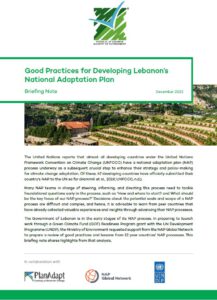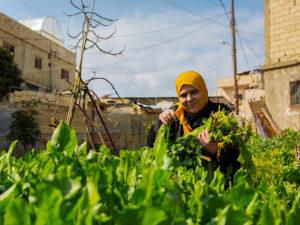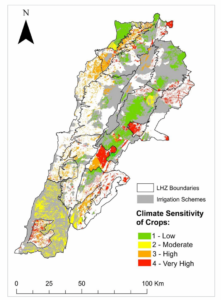Supporting the Development of Lebanon’s National Adaptation Plan Process

A range of climate scenarios has been developed for Lebanon, using a downscaled General Circulation Model called PRECIS, to predict the changes in temperature and precipitation in Lebanon by the end of the 21st century. Results showed that by 2040 temperatures will increase by around 1°C on the coast and up to 2°C in the hinterland; by 2090 it will further increase by 3.5°C to 5°C respectively. Rainfall is expected to decrease by 10-20% up to 2040 and eventually lead to a decrease of 45% in 2090. The summer days will witness a rise in temperature above 35°C and tropical nights higher than 25°C. In addition, the drought periods across all of Lebanon will increase by 9-18 days by 2090.
Furthermore, climate change will induce a reduction of 40% to 70% of the snow cover with an increase of 2°C to 4°C respectively, a shift of elevation of snowfall from 1500m to 1900m and a decrease in snowy conditions from 110 days to 45 days. This will influence the rivers and groundwater recharge and will impact water availability during the summer season and drought periods. Such changes are expected to have diverse effects on Lebanon’s environment, economy and social structure. Economic costs to Lebanon from climate change have been assessed in 2015. The increase in forest fires, pest outbreaks, and sea level rise will threaten the fragile biodiversity, ecosystems and natural habitats.

Lebanon submitted an updated Nationally Determined Contribution in 2021 and its Fourth National Communication in 2022 to the UNFCCC, which prioritizes climate change adaptation and highlights several key actions on biodiversity, forestry, agriculture, water resources, the coastal zone, health, and disaster risk management. However, Lebanon does not have a national climate change adaptation policy, strategy or action plan in place that provides an integrated strategic framework across sectors. Previously developed adaptation plans and strategies are sector-specific (e.g. water, agriculture), scattered and lack integration.
The Government of Lebanon is in the early stages of its NAP process that will launched through a Green Climate Fund (GCF) Readiness Program grant with the UN Development Programme (UNDP) and the Ministry of Environment. PlanAdapt, in partnership with the NAP Global Network and via the National Adaptation Plan Global Network (NAP GN)’s Country Support Hub, prepared a review of good practices and lessons from 12 peer countries’ NAP processes. The briefing note shares highlights from that analysis. PlanAdapt relies on long-standing and science-based expertise in NAP development (e.g. Woodruff 2018, in Albania, Cambodia, Morocco or Thailand).
In 2022, the MoE prepared and submitted a NAP Readiness proposal to the GCF (with the support of UNDP) titled “Increased Climate Resilience Planning for Municipal Water Resources in Lebanon”. The aim is to develop a medium and long-term approach to reduce vulnerability to climate impacts with a focus on water resources, facilitate the integration of climate adaptation into on-going planning processes while optimizing the use of existing plans in preparing the ground for the preparation of Lebanon’s National Adaptation Plan (NAP). Among the outcomes of the project is the development of (i) a Climate Change Adaptation Strategy, and (ii) a NAP implementation roadmap to strengthen the adaptation planning governance and institutional coordination.

To successfully develop Lebanon’s Climate Change Adaptation Strategy and NAP Implementation Roadmap, the MoE is looking for ways to learn from the experience of other developing countries that have already initiated the process and particularly those near the region (Balkans, North Africa) which share similarities with Lebanon. PlanAdapt’s team will review and analyse a wide range of different NAPs, and NAP roadmaps prepared by other countries, also using key resources to identify key trends and good practices in NaP development processes, such as the Tool for Assessing Adaptation in the NDCs (TAAN), NAP Trends, Summary Report on Progress in the Formulation and Implementation of NAPs.
This NAP guiding document will pave the way for the design of Lebanon’s Climate Change Adaptation Strategy and NAP implementation roadmap to be done under the GCF Readiness which is expected to kick off in 2024.
Read more about PlanAdapt’s efforts to support NAP development processes across the world:
- Moving from Planning to Action – Setting Priorities In Order to Fast Forward Morocco’s National Adaptation Plan
- Albania – How to Finance Climate Change Action in a Country That is at the Doorstep of the European Union
- Adapting to Climate Change in the Agricultural Sector in Thailand – Prioritising the Most Pressing Measures
- Integrating Climate Risk Management Across the Entire Governmental System in Cambodia
